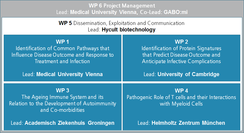Scientific and strategic Impact
The discovery of signatures which allow to distinguish which patients will develop persistent disease from those in whom the condition is more short-lived will allow predictive monitoring and individualized treatment minimizing drug toxicities and secondary co-morbidities. The results from the RELENT project will influence research not only in other areas of autoimmunity by providing novel resources, like iPSC cell lines, but also through gain of insight into pathways that are relevant and common in the course the diseases take. This will be achieved by providing insight into universal disease mechanisms, such as the role of FOXO3 in severity of disease, or by dissecting the antibody responses during the course of the disease.
RELENT will have the opportunity and the power to distinguish pathogenic pathways identified in patients from those employed under physiological conditions in the healthy ageing population and to uncover possible gender specific pathways and disease mechanisms - both important factors in developing chronic autoimmunity. The strategy proposed in the RELENT work program to unravel mechanisms common to a group of complex diseases is to perform hypothesis driven experimental research influenced by the results from genomics, proteomics and systems biology and to validate the results in vitro and in vivo. The results generated through this approach will allow to rapidly integrate new knowledge with significant impact on innovation capacity and how we strategically approach health research in general.







